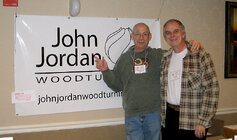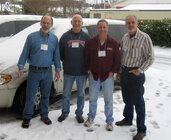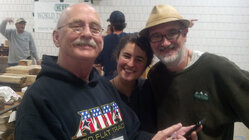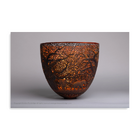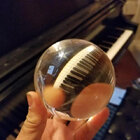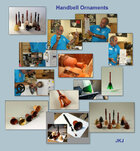- Joined
- Apr 25, 2004
- Messages
- 372
- Likes
- 0
- Location
- Burnt Chimney, SW Virginia
- Website
- www.burntchimneystudios.com
So as to avoid stealing the thread I have started a new one. And, my comments and concluding questions below may shift the direction a little.
I was the Program Director for SMLW for several years. We are 45 minutes or so from most of the members of a second club, the Blue Ridge Woodturners. In fact many of us belong to both clubs. If I invited a member of BRW to demo I paid them $40 or so and fed them a meal at our home on the evening of their demo. If the BRW member was nationally known, then he was paid his fee because he did an all day demo.
I never paid a club member to do an evening demo and feel that this is appropriate. On the other hand, if a club member does an all day demo then they should be compensated because the preparation effort required increases exponentially as the time increases linearly. If we had a member who was a professional demonstrator then it would be fair to expect them to do an evening "freebie" every two years or so. But, they should not be taken advantage of and be expected to serve as the default club demonstrator.
I predict that we are going to see some changes in the woodturning landscape as the number of professionals and professional demonstrators increases. We have long enjoyed an open and shared environment and I feel that this is because the demand has greatly exceeded the supply. Clubs tend to range from 25 to 75 members (my guess) and they can afford one or maybe two pros a year. We are all aware of larger clubs, but they are the exception, I think. The number of clubs is increasing, but not as rapidly as the number of people hoping to do professional demonstrations. So, as the demand decreases and return engagements are limited, I expect the market to change. I wonder if it is going to be like professional golf and some older demonstrators will become passe' and then become part of a senior circuit, getting fewer demonstration opportunities.
I encourage each of you to get out your crystal ball and give us your view of what you see down the road in the wonderful world of woodturning. Will market changes affect the sharing of techniques and ideas? What is the future for the itinerant demonstrators who have helped us grow as turners as they go around sharing their knowledge and the gospel of woodturning?
I was the Program Director for SMLW for several years. We are 45 minutes or so from most of the members of a second club, the Blue Ridge Woodturners. In fact many of us belong to both clubs. If I invited a member of BRW to demo I paid them $40 or so and fed them a meal at our home on the evening of their demo. If the BRW member was nationally known, then he was paid his fee because he did an all day demo.
I never paid a club member to do an evening demo and feel that this is appropriate. On the other hand, if a club member does an all day demo then they should be compensated because the preparation effort required increases exponentially as the time increases linearly. If we had a member who was a professional demonstrator then it would be fair to expect them to do an evening "freebie" every two years or so. But, they should not be taken advantage of and be expected to serve as the default club demonstrator.
I predict that we are going to see some changes in the woodturning landscape as the number of professionals and professional demonstrators increases. We have long enjoyed an open and shared environment and I feel that this is because the demand has greatly exceeded the supply. Clubs tend to range from 25 to 75 members (my guess) and they can afford one or maybe two pros a year. We are all aware of larger clubs, but they are the exception, I think. The number of clubs is increasing, but not as rapidly as the number of people hoping to do professional demonstrations. So, as the demand decreases and return engagements are limited, I expect the market to change. I wonder if it is going to be like professional golf and some older demonstrators will become passe' and then become part of a senior circuit, getting fewer demonstration opportunities.
I encourage each of you to get out your crystal ball and give us your view of what you see down the road in the wonderful world of woodturning. Will market changes affect the sharing of techniques and ideas? What is the future for the itinerant demonstrators who have helped us grow as turners as they go around sharing their knowledge and the gospel of woodturning?


